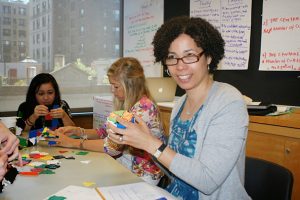 This September, the Graduate School of Education will launch two new master’s degree programs in areas with the deepest need: Teaching Students with Disabilities 7-12 Generalist and Teaching English to Speakers of Other Languages (TESOL).
This September, the Graduate School of Education will launch two new master’s degree programs in areas with the deepest need: Teaching Students with Disabilities 7-12 Generalist and Teaching English to Speakers of Other Languages (TESOL).
Expanding on the breadth of the school’s existing curriculum, resources, and faculty expertise, both programs will help increase Bank Street’s ability to attract new students and prepare high quality educators to make a difference in real-world classroom settings across the city.
“The expansion of the Graduate School allows us to make the Bank Street approach to teacher preparation more accessible to a larger number of educators with diverse interests,” said Cecelia Traugh, Dean of the Graduate School of Education. “We look forward to seeing the new programs come to life and welcoming a new cohort of students to Bank Street next year.”
Mimi Rosenberg, a longtime special educator and Graduate School faculty member, oversaw the development of the new Teaching Students with Disabilities 7-12 Generalist master’s program. The program will help address a persistent shortage of highly skilled secondary special education teachers and will blend components of the Graduate School’s special education curriculum with courses rooted in an understanding of adolescent development for a holistic approach to teaching students in middle and high school settings.
“In all secondary settings, adolescents are still developing, but the challenges during this period can be exacerbated for those with disabilities,” said Rosenberg. “Bank Street students will develop the ability to not only provide a rich academic curriculum for students, but to provide this education while taking into account the lived experiences of their students, including their families, communities, and schools.”
Teachers will be taught to work collaboratively across teams in inclusive and special education settings and to act as advocates for their students across many contexts, including school, home, employment, and community settings.
“Students with disabilities are particularly vulnerable to inequities in and outside of schools. We will develop teachers who are committed to ensuring their students’ needs are met and help them feel empowered to advocate for students in the face of adversity in school, work, or social settings,” added Rosenberg.
Development of the TESOL certification program was led by Cristian R. Solorza, GSE ’02, a veteran educator, staff developer, and Graduate School faculty member. The program will prepare teachers to teach English as a new language to speakers of other languages.
Solorza notes that there is a high local demand among both teachers-in-training and employers for the TESOL certification. Unlike other certification programs across the city, Bank Street’s TESOL program will help teachers develop a student-centered culturally responsive approach to teaching emergent bilingual children English.
“Usually, English is taught through very prescriptive methods, but that’s just not how language learners work,” said Solorza. “Our program will help teachers learn how to incorporate students’ diverse linguistic and cultural resources into teaching language. We want our teachers to be critical thinkers and innovators of teaching and learning.”
In addition, the program will prepare teachers for the many unique aspects of work in the field, including teaching in an integrated co-teaching model, working with administrators, serving students of varying grade levels, and managing large caseloads. “It’s a big job, so we created specific courses around managing data, working with people, and so on. That’s not something that other programs have,” Solorza added.
Both programs will remain true to Bank Street’s pedagogical roots, incorporating rich coursework with a solid foundation in human development and a full year of supervised work in the field. The first cohorts of graduate students will enter the programs in the fall of 2016.
Written by Ryan Weaver Cherecwich, a current student in the Graduate School of Education’s Teaching Literacy & Childhood Education dual certification program.